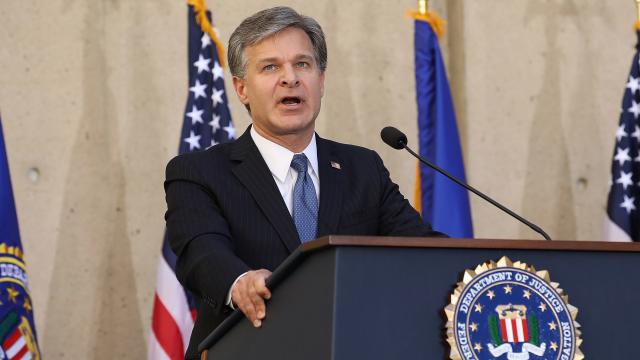The encryption war is quiet now, but the murky back-and-forth between Silicon Valley and Washington, D.C., is far from over.
FBI Director Christopher Wray said on Tuesday that the encryption issue is “getting worse and worse” for law enforcement around the United States at all levels. It’s a common refrain for government officials over the last half-decade, but it’s been a matter of sharp debate especially since the FBI overstated encryption device numbers last year.
“It can’t be a sustainable end state for there to be an entirely unfettered space that’s utterly beyond law enforcement for criminals to hide,” Wray said. “We have to figure out a way to deal with this problem.”
Wray was speaking to an audience of friendly and, at times, cheering Silicon Valley techies at the RSA Conference in San Francisco on Tuesday. The FBI director referenced ongoing discussions between the federal government and American tech companies on the issue of encrypted communications. On the details, however, he was vague and diplomatic.
“I’m hearing increasingly that there are solutions” for strong encryption that opens the targeted data to law enforcement, Wray said.
What exactly does “solutions” to end-to-end encrypted communications mean?
Wray gave no specifics, and the conversation immediately moved on at the direction of interviewer Susan Hennesey, the executive editor of Lawfare and former attorney in the Office of General Counsel of the National Security Agency.
The FBI did not respond to questions on the subject.
In 2017, Department of Justice Deputy Attorney General Rod Rosenstein argued for “responsible encryption,” which he argued is already in wide use.
“Examples include the central management of security keys and operating system updates; the scanning of content, like your emails, for advertising purposes; the simulcast of messages to multiple destinations at once; and key recovery when a user forgets the password to decrypt a laptop,” Rosenstein said. “No one calls any of those functions a ‘back door.’ In fact, those capabilities are marketed and sought out by many users.”
Last year, American investigators failed in an attempt to force Facebook to eavesdrop on voice calls over its encrypted Messenger app in a criminal case involving the MS-13 gang. Documents surrounding the case are being kept secret.
The biggest clash in the encryption war saga so far was the 2015 legal battle between the FBI and Apple. The FBI tried to force Apple to grant backdoor access to the iPhone of dead terrorist Syed Faros but Apple successfully fought off order until the bureau said it successfully gained access by buying hacking tools from an unspecified third party.
That 2015 fight coincided with the early stages of the 2016 presidential campaign. Then-candidate Donald Trump called for an impromptu boycott of Apple as the controversy was hitting front pages around the world.
“To think that Apple won’t allow us to get into her mobile phone? Who do they think they are? No, we have to open it,” Trump said during a February 2016 interview on Fox & Friends. “I agree 100 per cent with the courts. In that case, we should open it up.”
Apple CEO Tim Cook is now considered one of Silicon Valley’s most adept movers in Trump-era Washington, and so it seems unlikely that such a call would be repeated by President Trump—but making assumptions about D.C. in the past few years has proven to be a fool’s errand.
In December 2018, Australia passed a controversial encryption law requiring companies to give law enforcement and security agencies access to encrypted data like Facebook’s WhatsApp or Apple’s iMessage. The law was opposed by tech companies and privacy advocates, but it marked the first time a Western country passed a law requiring government access to encrypted data.
As a member of the Five Eyes intelligence alliance, Australia is a close ally and intelligence partner of the United States.
Although the Australian law is only four months old, it’s considered a major global test that’s being watched closely by American officials including at the FBI. We’ll have to wait to see if a legislative option is one of Wray’s “solutions” the FBI and Silicon Valley companies are discussing out of the public’s earshot.
Gizmodo would love to know more about the ongoing encryption discussion involving the U.S. government and tech companies. If you have insight, email poneill@gizmodo.com or use Signal to message +1-650-488-7247.
